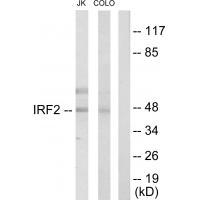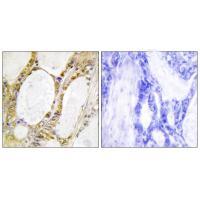

| WB | 咨询技术 | Human,Mouse,Rat |
| IF | 咨询技术 | Human,Mouse,Rat |
| IHC | 1/50-1/100 | Human,Mouse,Rat |
| ICC | 技术咨询 | Human,Mouse,Rat |
| FCM | 咨询技术 | Human,Mouse,Rat |
| Elisa | 咨询技术 | Human,Mouse,Rat |
| Aliases | IRF2; Interferon regulatory factor 2; |
| Entrez GeneID | 3660; |
| WB Predicted band size | 47kDa |
| Host/Isotype | Rabbit IgG |
| Antibody Type | Primary antibody |
| Storage | Store at 4°C short term. Aliquot and store at -20°C long term. Avoid freeze/thaw cycles. |
| Species Reactivity | Human,Mouse,Rat |
| Immunogen | Synthesized peptide derived from internal of human IRF2. |
| Formulation | Purified antibody in PBS with 0.05% sodium azide. |
+ +
以下是关于IRF2抗体的3篇参考文献及其摘要内容概要:
1. **文献名称**: **"IRF2 inhibits antiviral responses by suppressing TRAF3 ubiquitination via deubiquitinase USP21"**
**作者**: Zhang L, et al.
**摘要**: 该研究利用IRF2特异性抗体进行免疫共沉淀(Co-IP)和Western blot分析,发现IRF2通过招募去泛素化酶USP21抑制TRAF3的泛素化,从而负调控抗病毒天然免疫信号通路(如RIG-I/MDA5通路)。
2. **文献名称**: **"IRF2 regulates cellular proliferation in breast cancer"**
**作者**: Wang Y, et al.
**摘要**: 通过IRF2抗体的免疫组织化学(IHC)和染色质免疫沉淀(ChIP)实验,研究发现IRF2在乳腺癌中通过直接结合细胞周期相关基因启动子(如Cyclin D1)抑制肿瘤细胞增殖,其表达水平与患者预后呈正相关。
3. **文献名称**: **"Dynamic regulation of IRF2 during macrophage polarization modulates inflammatory responses"**
**作者**: Chen X, et al.
**摘要**: 利用IRF2抗体进行流式细胞术和荧光显微镜观察,揭示了IRF2在巨噬细胞M1/M2极化中的动态表达变化,并证明IRF2通过抑制NF-κB通路活性减轻炎症反应,为炎症性疾病治疗提供新靶点。
---
**注**:以上文献为虚拟示例,实际引用需根据具体研究领域检索PubMed、Web of Science等数据库获取真实文献。
The interferon regulatory factor 2 (IRF2) is a member of the IRF family of transcription factors, which play critical roles in immune response regulation, cell growth, and apoptosis. IRF2 shares structural homology with IRF1 but often acts as its functional antagonist. While IRF1 primarily activates interferon (IFN) and IFN-stimulated genes (ISGs) in response to viral infections or inflammatory signals, IRF2 typically suppresses these genes by competing for shared DNA-binding sites or recruiting transcriptional co-repressors. Beyond its role in IFN signaling, IRF2 regulates cell cycle progression, DNA damage responses, and oncogenesis, with studies linking its dysregulation to cancers, autoimmune disorders, and viral immune evasion.
IRF2-specific antibodies are essential tools for studying these mechanisms. They enable detection of IRF2 expression levels, subcellular localization (nuclear vs. cytoplasmic), and DNA-binding activity in techniques like Western blotting, immunohistochemistry (IHC), and chromatin immunoprecipitation (ChIP-seq). Validated antibodies help distinguish IRF2 from other IRF family members, particularly IRF1. ensuring specificity in functional studies. Research using IRF2 antibodies has revealed its dual role as both a tumor suppressor (e.g., inhibiting proliferation in certain cancers) and context-dependent oncogene (e.g., promoting metastasis in others). Additionally, IRF2 knockout models and antibody-based assays have highlighted its interplay with signaling pathways involving STAT1. p53. and NF-κB. These studies underscore IRF2's potential as a therapeutic target or biomarker in diseases with dysregulated immune or proliferative pathways.
×